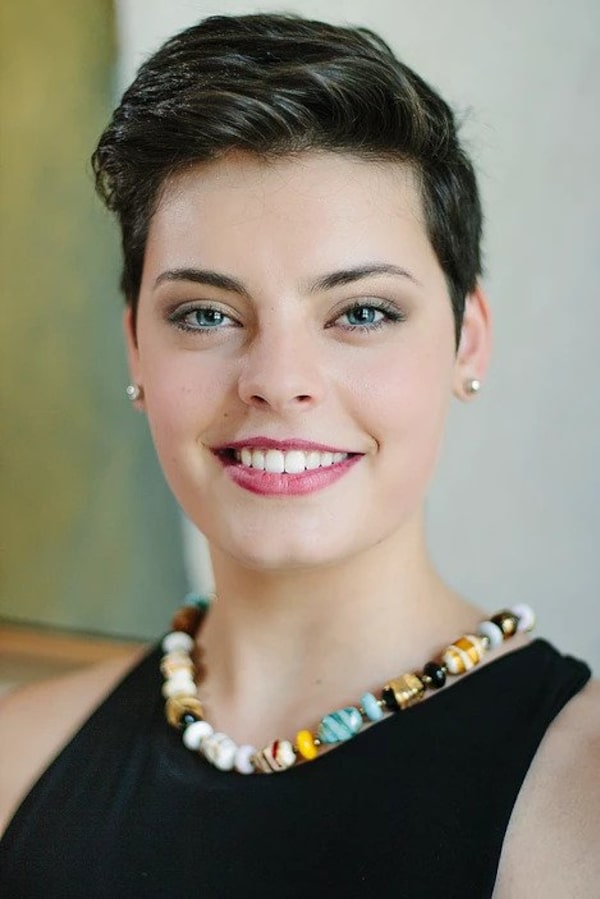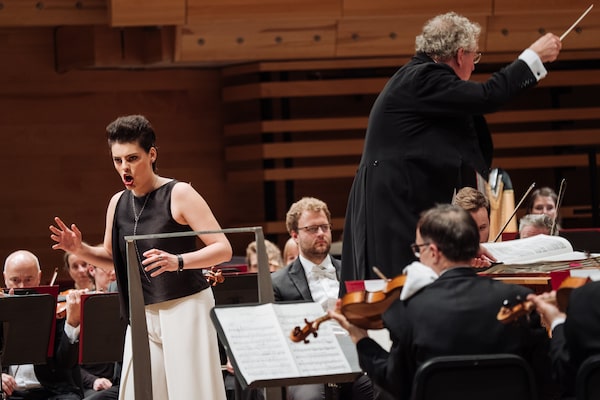
Emily D'Angelo's recent win at the Operalia Competition us just the latest in what has been a competition streak for the singer.
At just 23, Canadian mezzo-soprano Emily D’Angelo winning the 2018 Operalia Competition in September carries particular weight. The annual voice competition, founded by famed tenor Placido Domingo, is among the highest-profile events in the operatic industry. Its final rounds are broadcast live for the world to watch; the singers who compete are under extreme scrutiny, yet with an audience as large and as invested as this one, an Operalia finalist has the ears of the entire opera industry – an efficient audition process if there ever was one.
“Not only friends and family can tune in, but casting people can tune in,” says D’Angelo of her super-sized audience at this year’s competition in Lisbon. “If you perform well, it’s a world-broadcasted audition opportunity.”
And D’Angelo has certainly impressed. She took home First Prize among the women, the Audience Prize, the Birgit Nilsson Prize (reserved for excellent singing of arias by Wagner and Strauss) and the Zarzuela Prize, which celebrates the Spanish light-opera genre that was a cornerstone of Domingo’s own career. Her haul for all four prizes: US$55,000 and a Rolex wristwatch.
D’Angelo is now thrust conspicuously front and centre among today’s working opera singers. Not only did she take three prizes at one of the top singing competitions, and not only did she do it at a remarkably young age, but her Operalia win is only the latest in what has been a competition streak for the mezzo-soprano.
Just in the past two years, she has won the Metropolitan Opera National Council Auditions, the Gerda Lissner International Voice Competition and the George London Competition – and that’s not even counting her prizes at the Montreal International Competition and the Neue Stimmen Competition.
Warren Jones, renowned pianist and coach, and a judge of this year’s Montreal International Competition, says he seldom sits on juries where there are long discussions about who should win. “The winner was quite evident," he says.
D’Angelo’s wins have been evident and well deserved. She has a voice and stage presence that belie her 23 years; clearly gifted with a good dose of natural talent, D’Angelo’s consistency and attention to detail signal that her skill is nurtured as well.
“The voice, at 16, was pretty obviously something special,” says Elizabeth McDonald, voice instructor at the University of Toronto, and D’Angelo’s teacher from her teen years throughout her four-year bachelor of music. D’Angelo has spent her education and early career seemingly in a permanent state of being ahead of the pack. It’s something Alexander Neef, general director of the Canadian Opera Company, noticed during her time as a young artist in the company’s Ensemble Studio program in the 2016/17 season. “I would jokingly say to her, ‘What are you doing here?’ ”
She has a voice and stage presence that belie her 23 years
For those who lead the opera industry – artistic directors, music directors, agents – D’Angelo is certainly an attractive prospect. Opera bosses will vie for the young artist’s time, offering her enticing job offers, which, if she accepts, will have her singing exciting new roles in the world’s major opera houses. In fact, it’s already begun; the Metropolitan Opera recently announced that D’Angelo will sing Annio in its 2019 production of Mozart’s La clemenza di Tito, a role she was originally set to understudy as a member of the Lindemann Young Artist Development Programme.
“The Met very, very rarely would put a young artist onstage in a principal role,” Neef says. He sees the Clemenza cast change as a strong message of the Met’s confidence in D’Angelo, a sentiment that will no doubt be echoed by other major opera houses. “It’s the whole thing in a nutshell, really,” he adds.
The opera industry is equal parts excited and suspicious about young talent. Long gone are the days of Maria Callas, who sang Tosca at 18; today’s opera singers are judged not only on their voices, but on their ability to wisely – meaning, conservatively – pace their careers. D’Angelo’s string of competition wins has made the opera world stop and listen; as she begins a season that puts her on major stages, that same opera world will now lean in and see if she can indeed pull it off. “The level gets higher and higher,” she says. Now that the the industry is listening to her intently, “it becomes less about surprising people, and more about meeting an expectation.”
Neef agrees. “That’s something almost all famous performers struggle with. How do you keep up with the fame, and how do you keep delivering?”
D’Angelo’s run out of the gate is reminiscent of how we first met American soprano Nadine Sierra, who made her operatic debut at just 16, and by 22 was singing at San Francisco Opera. It’s similar too to fellow Canadian Simone Osborne, who won the Metropolitan Opera National Council Auditions at just 21. For both young singers, after the initial applause had subsided, all ears were on what they did next. As Jones puts it, “A lot of people think that winning the contest is the final act. It’s actually the beginning.”
For D’Angelo, her string of competition wins leaves no doubt of her ability to sing consistently and excellently. Left open are the cynical questions: Does she have what it takes to be an opera singer? Does she take direction well? Is she collegial? Reliable? Prepared? Does she know how to keep healthy through a year of travel? And most importantly, will she make wise decisions about which offers to accept, and which to turn down?

D'Angelo performs at the 2018 Montreal International Competition.
“It’s always interesting to watch some young singers, who allow themselves to be pushed around,” Jones says, “and who sort of abdicate responsibility for musical and artistic and vocal choices.” D’Angelo, he suspects, is not one of those young singers.
“There are far more no’s than yeses,” D’Angelo says of the roles she’s currently ready to take on. Opera singers, like professional athletes, often have two choices available to them – a sprint, or a marathon – and the difference lies in pacing. “When you’re 23, you probably have another 35 to 40 years of singing front of you if you do it right,” Neef says. “You can really take your time.”
What D’Angelo sings may be conservative for now, but it’s where she sings it that stands out. This season she’ll make house debuts at the Berlin State Opera and the Santa Fe Opera, and she’ll return to The Metropolitan Opera and – to the certain anticipation of Torontonians, the Canadian Opera Company, for Atom Egoyan’s imaginative production of Cosi fan tutte at the Canadian Opera Company (February, 2019).
D’Angelo looks forward to when, in a few short years, her age will be much less interesting a talking point. By that time, she won’t have an age card to play, only a decent head start. “It’s definitely a theme,” D’Angelo says of her young age, and the raised eyebrows that often appear when she sings for industry professionals. “I’m very much aware of the fact that one day it won’t be a theme anymore. You’re young until you’re not.”
“It would have been very easy for [D’Angelo] to just be the very excellent singer that stood out from the beginning,” McDonald says. “But she never played that role.” As a student at the University of Toronto, D’Angelo was the supportive colleague who attended every single one of her classmates’ graduating recitals. And now as a young professional, D’Angelo is still led not by her own singing successes, but by the platform for communication she has on the opera stage.
McDonald foreshadows: “I think she’s going to be the person who will have something to say beyond just opera.”